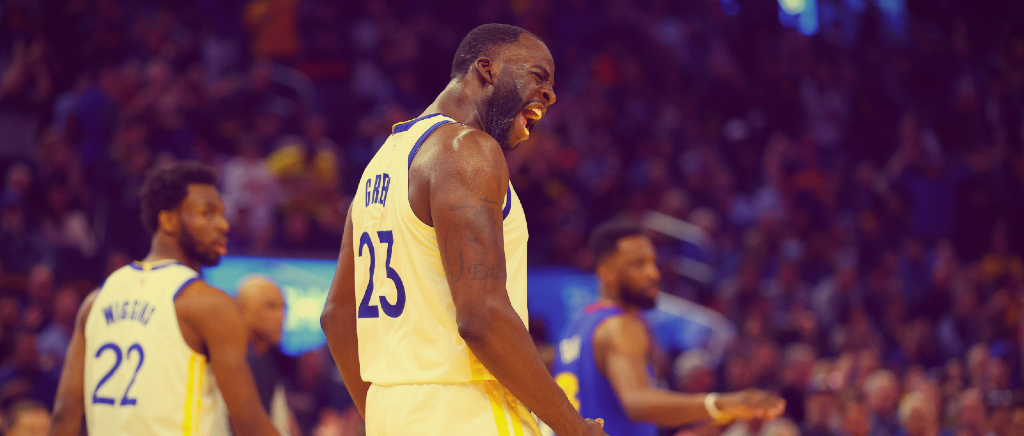There are great paradoxes in sports — leave it all on the field but don’t give anything away, it ain’t over ’til it’s over, both teams played hard — and after the Warriors beat the Nuggets in Game 3, Draymond Green laid down another.
"Some guys that you think are guys are not guys."
Who's Dray talking about? 👀
(via @NBCSAuthentic) pic.twitter.com/0VTZjXKVRA
— Bleacher Report (@BleacherReport) April 22, 2022
“You gotta give credit to guys who show up in the playoffs, because it’s just not a normal thing around this league,” Green says, “You look around and some guys that you think are Guys, are not Guys in the playoffs.”
If you thought this was an answer about Gary Payton II, and how well he’s been performing in the now 3-1 series, that’s fine. It was. But chances are if you heard this quote a few days ago, or are hearing it for the first time now, you found yourself quietly murmuring those last few words.
Some guys that you think are Guys are not Guys.
Trust Green, Cheshire cat as he can be, to lay this cipher for chaps, this fiddlestick for fellas, at our feet. Because you likely don’t need more to worry about these NBA playoffs, let alone the legitimacy of men, leave it to us, the experts, to get to the bottom of what Green meant.
First, it seems imperative to define the guy in question. That is, the capital G Guy that Green held up as the model for, we can surmise, the lowercase g guys out there. Green would certainly consider himself a Guy and it was Payton II that propelled him to this paradox, so he’s in. Steph Curry, Andrew Wiggins, Jordan Poole, they were all mentioned in Green’s postgame when it came to having capital G guy attributes. Some people are replying on Twitter to that clip saying that Green definitely meant Nikola Jokic, who he’s been slugging it out with under the basket this whole series, however, Green praises the Joker profusely, so he definitely thinks he’s a Guy for sure.
Is Green biased? Absolutely. So for the sake of good data and ultimate clarification, we need to establish a more objective control group. We have to broaden the scope of guys and look back on the business of bros in the league. The criteria for picking guys who are Guys in this sense is several-fold. First, they typically aren’t the stars of their teams. That’s why LeBron James, Michael Jordan, Bill Russell and Kareem Abdul-Jabbar aren’t going to be included. They are 100% guys but they are thee guy, who could exist in an isolated basketball plane devoid of all other dudes and still hold guy perpetuity. Also I can’t imagine including Russell and Abdul-Jabbar in this idiotic exercise. Obviously, Curry and Jokic are modern exceptions, Curry probably the most, and Jokic’s own Guy, Jamal Murray, is absent. Because of that Jokic is the Nuggets’ default star this postseason, but he is a rare star more comfortable being a Guy. You know this because you’ve seen the pictures of him in his harness racing cart. You see where I’m going with this?
Draymond’s guys vs. Guys concept is an evolution of the 16-Game Player theorem, that posits some players are simply more suited to playoff basketball, while others are 82-game players, who thrive in the regular season but don’t create the same impact come playoff time.
Some conclusive, classic guys who are Guys include:
– Robert Horry
– Ray Allen
– Rasheed Wallace
– Derek Fisher
– Manu Ginobili
– Dennis Rodman
More modern guys, pulled from the last half dozen title teams:
– Kyle Lowry
– J.R. Smith
– Khris Middleton
– Alex Caruso
– Harrison Barnes
– Danny Green
And because it’s crucial to illustrate dudes who are still Guys, whether or not they’ve had the chance to contribute to championship teams:
– Steven Adams
– P.J. Tucker
– Jonas Valanciunas
– Kind of the entire roster of the Bulls
– Cam Payne
– George Hill
– T.J. McConnell
– Lu Dort
– Terry Rozier
– Trevor Ariza
– Marcus Smart
Even this year, we are seeing some Emerging Guys, proving themselves as one of those coveted 16-game players.
– Jalen Brunson
– Anthony Edwards (potentially a The Guy)
– Herbert Jones
– Tyrese Maxey
The biggest takeaway from these lists is that Guyhood is always in flux, which makes even tallying lists of guys feel as impossible as holding running water in your hands. Such is the precious resource of being a Guy. It’s also a changeable state of being. For example, Kentavious Caldwell-Pope was long a guy with the Lakers, but in 2019-2020 became a certified Guy when the Lakers won the title in the Bubble. Caldwell-Pope eclipsed his own Guydom. He was like the moon moving into the Earth’s shadow, but in his case the moon was him as a Guy and the Earth was him as the guy. Much in the way that all dudes don’t, or can’t necessarily, rock, not all guys are going to get to be, or stay, Guys.
But back to Green’s perceived dig.
In light of the precise, extremely authoritative history of Guys painstakingly laid out here, Green was perhaps only trying to pin down one of the most ephemeral concepts. He didn’t name any guys explicitly who were not Guys, and indeed, one could argue that only guys who didn’t consider themselves Guys already would see themselves in Green’s words. Guys would not think of themselves as not Guys, they would frankly probably not be watching postgame press conferences during the playoffs, either. Green wasn’t out to make us doubt the existence of Guys in general, or Guys in these playoffs, only to make us consider who is one by examining what we think about when we think about guys.







